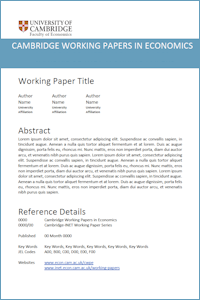
Ogilvie, S. and Küpker, M.
Human Capital Investment in a Late-Developing
Economy: Evidence from Württemberg, c. 1600 – c. 1900
CWPE1528
Abstract: Modern growth models view human capital, particularly education, as central to economic growth. But historical evidence has proved elusive. This paper investigates human capital levels in Württemberg, a late-developing German economy, between 1610 and 1899. Württemberg achieved higher and more universal literacy than any other European economy before 1800. A multivariate analysis reveals that this exceptional level of human capital in Württemberg was largely decoupled from economic variables from a very early date. Literacy declined significantly with individuals’ age, suggesting that education was irrelevant to economic life. The Württemberg human capital miracle was unrelated to economic growth or human development indicators, casting doubt on theories that ascribe education a central role in economic growth.
Keywords: capital, education, growth, Germany
JEL Codes: N33 E24 J24 O15
Author links:
PDF: https://www.econ.cam.ac.uk/research-files/repec/cam/pdf/cwpe1528.pdf 
Open Access Link: https://doi.org/10.17863/CAM.5807
